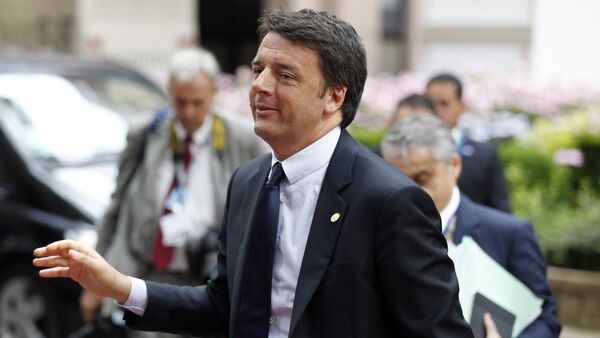MOSCOW (Sputnik) — Earlier in the week, the Italian Court of Cassation approved the holding of a referendum on the constitutional changes aimed, according to Renzi, at streamlining Italy's political system, saving money, enabling laws to be passed quickly and leading to the stabilization of future governments.
"It is a reform that limits the power of the citizens. It does not abolish the Senate, which will no longer be elected by the people but by councilors between themselves, increases the powers of the prime minister," the lawmaker, who is a member of the Senate's Constitutional Affairs Committee, said.
"The political class of regional councilors is the most corrupt in the history of the Italian republic and these regional directors appointed to the Senate will be able to enjoy parliamentary immunity, i.e. the possibility of not being prosecuted by the judiciary," the opposition lawmaker lambasted the proposed changes to the Senate.
Crimi added that the changes in election process of the Chamber of Deputies "will give absolute power with a strong majority bonus to those who take one single vote over political opponent, even if it is a small portion of the electorate".
Finally, the other stated purpose of the constitutional changes — the reducing of costs- is also unlikely to materialize, according to Crimi.
"It does not reduce the cost because the Senate will continue to exist, with its palaces, its offices, its privileges," he said.
Italian citizens will vote against the changes to the constitution proposed by Prime Minister Matteo Renzi as they clearly understand that the suggested reforms are written for the benefits of a political class, not ordinary citizens, Crimi told Sputnik.
"The Italian people will say NO to this reform, the chances of the prime minister are very slim, because the Italians understand that it was written by a political class that is far from the real problems of the citizens, who only seeks to keep the command attached to their chair," Crimi, a member of the Senate's Constitutional Affairs Committee, predicted.
"It was the same Renzi to focus everything on himself rather than on the content of the reform. We, M5S, are trying to explain the contents of the reform, motivating point by point why it should be blocked, while Renzi continues to do what he is good at, threatening that if the reform does not pass he will resign," the lawmaker claimed, adding that "for many Italians the temptation to give a strong signal of no-confidence to Renzi is high."
The date of the popular vote is to be set by the prime minister in within 55 days. It is expected in late October or November this year.
Earlier this week, another member of the Senate's Constitutional Affairs Committee Lucio Malan from the opposition Forza Italia party told Sputnik that the cut of costs amounted to only 51.5 million euros ($57.5 million), while the introduction of the run-off for national elections, as suggested by Renzi, would increase the costs by 60 million euros, calling the promises of spending cuts "mere false propaganda."
The referendum on constitutional reforms is expected to be held in late October or November. After Monday's court decision to approve the referendum Renzi now has 60 days to set a date for a public vote.



